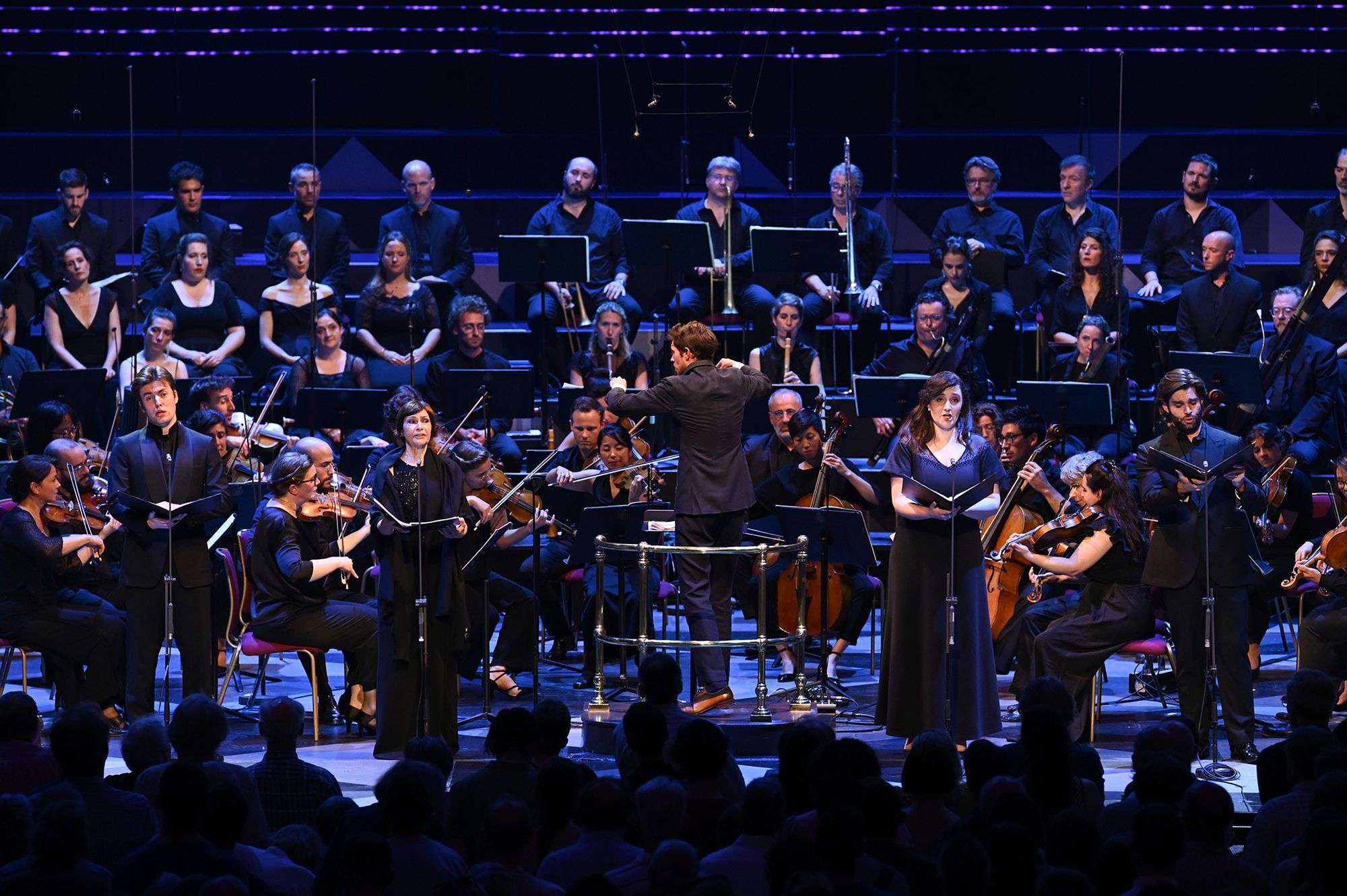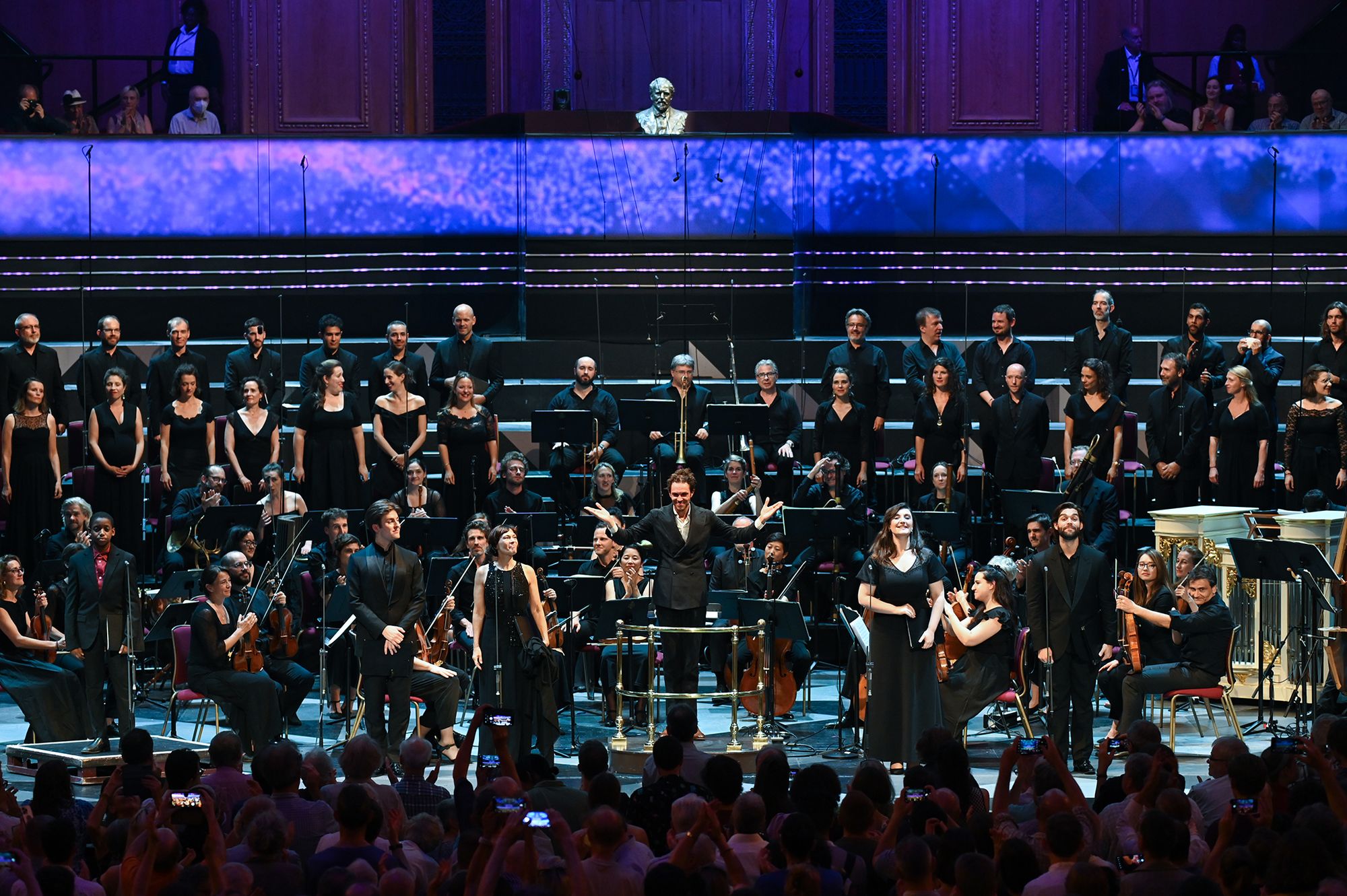Miraculous Mozart at the Proms from Pichon
This has to be my Prom of the year! Unforgettable

PROM 69 Mozart/Süssmayr Requiem + Malakai Bayoh (treble); Sandrine Piau (soprano); Beth Taylor (mezzo); Laurence Kilsby (tenor); Alex Rosen (bass); Pygmalion / Raphaël Pichon. Royal Albert Hall, 7.9.2023
Trad. Plainsong ‘In paradisum’
Mozart Requiem in D minor (1791, compl. Süssmayr)
Interspersed with:
Ach, zu kurz ist unsers Lebenslauf ,‘ K 229 / 515b (c. 1787)
Meistermusik, K 477 (1785)
Miserere (Kyrie in D minor), K 90 (1772)
Thamos, King of Egypt, K. Anh. 122 (? 1776)– ‘Ne pulvis et cinis’
Solfeggios, K 393 (1782) – No. 2
Requiem in D minor (1791) – Amen (fragment)
Quis te comprehendat, K Anh. 110 (1781 or 1783/4, arr. Anon, c. 1820)
Kirchenlieder,, K 343 / K 336c (1787) – No. 2: O Gottes Lamm
Trad. Plainsong ‘In paradisum’
What a way to end my Proms season! A programme of the utmost imagination, performed straight through with no interval, boasting orchestral playing of the highest order, and choral singing of a positively stratospheric bent. A packed Albert Hall received the gift of the season.
There was one substitution, and a luxury one at that – Sandrine Piau standing in for an indisposed Erin Morley (I wonder how late this substitution was, as the progeamme still gave Morley as soprano soloist. and there was no insert).
This ‘biographical journey of memories’ as described by Pichon, begins with an incomplete performance of the plainchant In Paradisum, a piece normally heard at the end of the Requiem. It is interrupted, though, by the Requiem itself and returns, fully-formed at the end. The boy treble here was Malakai Bayoh, last seen in my reviews as Oberto in Handel’s Alcina at the Royal Opera House, Covent Garden (review). Bayoh’s voice is remarkable, and he sang the unaccompanied opening to the concert with remarkably pure expression. He ended with ‘In para …'

The music handed over like a baton to the double canon (performed by all four of the evening’s soloists) Ach, zu kurz ist unders Lebenslauf! (Alas! Our lives are too short!) reflecting the use of canon in the Requiem itself. The performance here had a certain transparency that certainly characterised the evening; it led to the dark orchestral sonorities of the Meistermusik (better known in its later, purely orchestral, form as the Mauerische Trauermusik, the Masonic Funeral Music). This was perfectly placed, the orchestra carrying what felt like the weight of a cross (or perhaps the Cross), 18 singers from Pygmailion providing the perfect delivery of the text (from Lamentations: ‘Replvit me amaritudinibus – He hath filled me with bitterness)’. A larger choir (I counted 37) sand, perfectly balanced, the Miserere mei (the Kyrie in D minor). Composed in.the strict style propounded by the Viennese Kapellmeister Johann Joseph Fux (1660-1741) channelled to Mozart via his teacher Giovanni Battista Martini (1706-84). This Kyrie pre-echoes the Requiem in keyt but also in melodic contour, so it was a fitting lead-in to …
The Requiem proper was the one of the finest performances this reviewer has ever heard. Pygmalion’s choral aspect is only, surely, equalled and surpassed by accentus. Pygmalion’s clarity purity, power, strength and ability to perform without compromise at a whisper is almost superhuman. The ‘Kyrie’ was crisp, the semiquavers so clear, not a misplaced aspirant in sight.
It was a treat to hear ‘Ne pulvis et cinis’ from the incidental music to the play Thamos, König in Ägypten b Tobias Philipp von Gebler (1726-86), a bass solo and choir with orchestra of truly apocalyptic ambition. Bass Alex Rosen was superb. In the original Thamos, this was ‘Ihr Kinder des Staubes’; tis Latin version was ound amongst Mozart’s manuscripts posthumously. Ther eis certainly a touch of the darker side of Zauberflöte about this; and how the (somehow together) final chords morphed perfectly into the sheer impact of the ‘Dies irae’ of the Requiem. Taken at quite a lick, this was infinitely exciting, echoes of ‘Dies irae, dies illa’ full of tremulous power. The two pieces work perfectly also because rosen opens the ‘Tuba mirum’ section of the ‘Dies irae’. A rare disappointment of the evening here, though, in the underpowered entrance at ‘Mors stupebit’ of tenor Lawrence Kilby. No accusation of that could be made of mezzo Beth Taylor, strong, almost a contralto in the creamy milkiness of her sound.
How tender the upper voices of Pygmalion in the ‘Salva me’ - vulnerable in extremis. A cruelly exposed opening to the Solfeggio (a vocalise) was hardly a problem for Bayoh. It is accompanied by strings and includes various challenges, not least trills (rare to hear them so well delivered) and an exposed passage in the singer’s lower range (again, well done).

The soloists blended perfectly in the ‘Recordare’ (bass and mezzo in particular, Rosen and Taylor, a match made in a calmer Heaven than that espoused in the ‘Dies irae’). How urgent was ‘Quaerns me’ (Seeking me). The choir responded with the most remarkable ‘Confutatis,’ a panel shot through with extreme contrasts, a tender ‘Voca me’ against the granitic insistence of the opening. And then, a tribute to the excellence of the performance if ever there was one – pure silence between the ‘Confutatis’ and the ‘Lachrymosa’. This latter was infinitely touching as opposed to monumental, and moved straight into the Requiem fragment of an ‘Amen’ (itself a repetition ofteh final word of the ‘Lacrimosa’) which stopped in mid-flow.
The pause after that curtailed Amen was super-charged with what might have been. Pichon allowed an extended pause before the steam train of the ‘Offertorium’ started, virtuoso for the choir, operatic in nature. And how modern the angular line of ‘Ne absorbeat’ sounded.
Probably the most remarkable added piece of this evening was the parodistic motet, Quis te comprehendat. It takes the Adagio from the Gran Partita (one of Mozart’s most sublime compositions) and transfers it to orchetrsa (so the syncopated bed of sound is heard on strings, and words are heard above – but the sublime oboe and clarinet solos remain) - Gabriel Pidoux and Nicola Boud, respectively. Found in the ‘Übertragene Kompositionen' part of the Mozart catalogue's appendix, the parody is anonymous. This was magic indeed, a reframing of the outdoorsy familiar music into a specifically ecclesiastical setting. The passage for two clarinets, intertwining registrally, was revelatory (Boud and Fional Mitchell).
Hearing the ‘Hostias,’ ‘Sanctus,’ ‘Benedictus’ together made perfect sense, the light-textured ‘Hostias’ (what a pianissimo at ‘Fac eas, Domine’!), the radiant ‘Sanctus’ (the choral parts coming together in a final statement of ‘Osanna in excelsis’ shot through with light) and the beautifully balanced ‘Bendectus’.
It was fascinating to hear one of two Church Songs, ‘O Gottes Lamm,’ positively hymnic and superbly, resonantly performed by mezzo Beth Taylor. It formed the perfect contrast to the ‘Agnus Dei’ - now came the monumentalist aspect of Mozart’s Requiem, Pichon allowing us to relish the intricacy of Mozart’s string qriting anew. Finally, a glowing ‘Lux aeterna’ from Piau. And how the ‘Cum sanctis’ scampered before the final contrast – the full plainsong In Paradisum, enhanced by sopranos in canon, their final arrival on a unison. The timeless, eternal aspect of plainchant seemed to be the perfect way to close.

Unforgettable. It is true that such an approach that includes a fragment of the original brings back memories of Insula’s extraordinary Mozart Requiem at La Seine Musicale in June 2018, itself an event for the ages; but Pichon’s approach was wholly individual, considered, theatrical and yet simultaneously deeply spiritual. This has to be my Prom of the year.
All images © Chris Christodoulou
A couple of Pygmalion's discs are linked below:
